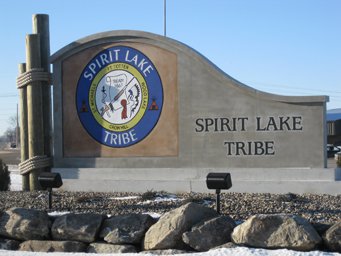Audio: Former Spirit Lake Tribal Judge Says Children Still Living With Sex Offenders On Reservation

Earlier today the Grand Forks Herald ran a report quoting current Spirit Lake Tribal Judge Shirley Cain as saying that there are no children being placed with sex offenders on the reservation.
The federal government was forced to step in at Spirit Lake to take over the tribes child services programs after whistle blowers revealed that children weren’t being adequately protected.
“No children are placed with sexual predators,” the Herald’s Chuck Haga reported. “I am a stickler for that. I have the book (listing convicted sex offenders, their crimes and places of residence). I know who the registered sex offenders are.”
But another Spirit Lake tribal judge, Molly McDonald who served until 2012, tells me that claim isn’t true. In fact, I read her that quote, and asked her if she felt it was true.
“No, I don’t,” she told me. “I could name three registered sex offenders [with children living with them] right off the top of my head.”
“I’m not seeing any progress being made as far as CPS [child protection services] issues,” McDonald told me, referring to the state of child services after the federal government’s Bureau of Indian Affairs stepped in.
I also asked McDonald about the controversy surrounding Rep. Kevin Cramer and his comments about the Violence Against Women Act. McDonald told me that while she does feel the law is a step in the right direction, she doesn’t feel a tribe like Spirit Lake is ready for it.
“There were a lot of issues that weren’t ironed out before that passed,” she told me. Among those issues? Right now the Spirit Lake tribe doesn’t have a public defender who can provide constitutionally-mandated legal counsel to those who cannot afford their own lawyer. McDonald doesn’t think the tribe could pay for one, either.
McDonald also points out that the tribe really doesn’t have a legal or sound appeals process for those convicted of crimes. Under current tribal law, the appeals process runs through the South Dakota-based Northern Plains Intertribal Court of Appeals, but the tribe didn’t pay a $3,000 renewal process. McDonald tells me that the tribe did change the law to allow appeal to a council of tribal elders, but she’s skeptical that such a council is a legally sound appeals process and she points out that such a change in tribal law would require a vote of the full tribe. It’s not a change the tribe itself can make.
Meaning, under both tribal and federal law, the tribe really doesn’t have a legal appeals process. Yet, under the Violence Against Women Act, the tribe has expanded jurisdiction over non-tribal members.
At the end of the interview, I asked McDonald what she thought could help fix the problems on the reservation. She said “cooperation,” alluding to the fact that jurisdictional and territorial fights among the various tribal agencies stymies those seeking justice.
“Nobody wanted to do more than they had to do,” she told me. I asked if that was true even when children were being abused, and when the perpetrators of violence weren’t being brought to justice, and she replied “absolutely.”







